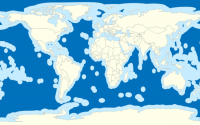Innocent Passage

Innocent passage is a concept in law of the sea which allows for a vessel to pass through the territorial waters of another state subject to certain restrictions. The UN Convention on the Law of the Sea defines innocent passage as: "Passage is innocent so long as it is not prejudicial to the peace, good order or security of the coastal State. Such passage shall take place in conformity with this Convention and with other rules of international law."
Quicktabs: Keywords
Perhaps most notably, the convention clarifies the difference between military activities and innocent passage, an increasingly important distinction in international disputes over freedom of navigation rights.7 For example, surveying and using weapons or intelligence-gathering capabilities (e.g., tapping into seabed fiber optic cables) in territorial waters are activities that violate innocent passage as described in the convention.8 LOSC also specifies norms and duties for submarines and other underwater vehicles, surface vessels and aircraft that must be met to ensure innocent passage in territorial waters and international straits. Submarines or other underwater vehicles operating in another state’s territorial waters, for example, are required to surface and show their flag in order to signal innocent passage.9
The militarization of outer space should depend on the categorical regions of space. In territorial space, states should be allowed to use whatever force is reasonably necessary to ensure their interests. Much like the Coast Guard in the United States, armed patrol vessels may be necessary to protect the state from threats of harm ranging from customs violations to people smuggling. However, presence in territorial waters should not be sufficient to detain those engaged in innocent passage to a space port in orbit or on the celestial body. Vessels will require supplies, repairs, food, fuel and other materials for voyages, necessities which should not be restricted. By allowing open uses of territorial space for innocent passage, vessels will be able to effectively obtain supplies and make repairs. This freedom will also provide pecuniary compensation to those states. In transitory space, vessels should not face constant intrusions of being boarded and searched. Like the high seas, transitory space should allow for the quickest passage of vessels and the most freedoms. By disallowing unprovoked arrests of vessels, more powerful states will not be allowed a virtual monopoly based on their military forces. Likewise, military and government vessels are prohibited from being arrested. These restrictions support the sovereignty of each state over its persons.
